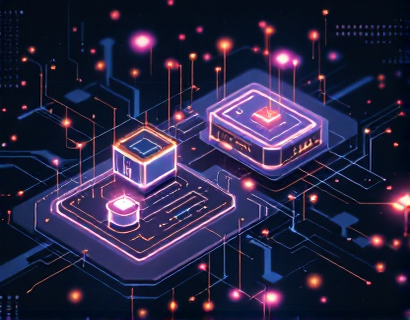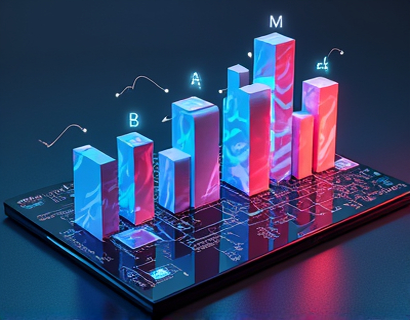Blockchain Oracle Management: Empowering Decentralized Applications with Advanced Data Integration and Smart Contract Solutions
In the rapidly evolving landscape of blockchain technology, the role of oracle management has become increasingly pivotal for the success of decentralized applications (dApps). Oracle management refers to the process of integrating external data sources with smart contracts on a blockchain, enabling these contracts to access and utilize real-world data. This integration is crucial for enhancing the functionality and reliability of dApps, as it allows them to interact with the external world beyond the confines of the blockchain network. This article delves into the transformative software solutions that are revolutionizing oracle management, focusing on how these advancements empower developers and businesses to fully leverage the potential of blockchain technology.
Understanding the Importance of Oracle Management
Oracle management is essential for dApps that require real-time data to function effectively. Smart contracts, the self-executing contracts with the terms directly written into code, rely on accurate and timely data to make informed decisions. Without reliable oracles, smart contracts would be limited to operating based solely on pre-programmed conditions, missing out on the dynamic and ever-changing data that exists outside the blockchain. This limitation can hinder the practical applications of blockchain in various industries, from finance and supply chain management to healthcare and voting systems.
The primary challenge in oracle management is ensuring the security, accuracy, and efficiency of data transmission between the blockchain and external sources. Oracles must be trustworthy and resistant to manipulation, as any compromise can lead to incorrect data being fed into smart contracts, resulting in unintended consequences. Moreover, the data integration process must be seamless and low-latency to maintain the responsiveness and usability of dApps.
Advanced Data Integration Techniques
To address these challenges, advanced data integration techniques have been developed to enhance the capabilities of oracles. These techniques focus on creating robust and flexible systems that can handle various types of data, from structured to unstructured, and from multiple sources. One such approach is the use of decentralized data markets, where data providers and consumers interact directly on the blockchain, facilitated by smart contracts. This model not only ensures data quality through reputation systems but also incentivizes accurate data provision through token-based rewards.
Another significant advancement is the implementation of data validation and verification mechanisms. These mechanisms employ cryptographic techniques and consensus algorithms to ensure the integrity of the data before it is integrated into smart contracts. For instance, oracles can use multi-signature wallets and time-locked transactions to prevent unauthorized data manipulation. Additionally, blockchain-based data storage solutions, such as InterPlanetary File System (IPFS), can be utilized to store and retrieve large datasets efficiently and securely.
Enhancing Smart Contract Functionality
With reliable data integration in place, smart contracts can be empowered to perform more complex and meaningful tasks. Advanced oracle management solutions provide developers with tools to build more sophisticated smart contracts that can process and analyze real-time data, make decisions based on that data, and execute actions accordingly. This capability opens up a wide range of applications, from automated trading platforms that adjust strategies based on market data to decentralized finance (DeFi) protocols that offer dynamic lending and borrowing services.
One key feature of these enhanced smart contracts is their ability to handle conditional logic and complex workflows. For example, a smart contract in a supply chain management system can use data from various oracles to track the location and condition of goods in transit. Based on this data, the contract can automatically trigger payments to suppliers once the goods reach the designated location and meet predefined quality standards. This level of automation and precision significantly reduces the need for intermediaries and increases the efficiency of the entire supply chain process.
Security and Trust in Oracle Management
Security remains a paramount concern in oracle management. To mitigate risks, advanced solutions implement multi-oracle aggregation, where data from multiple independent oracles is combined to form a consensus. This approach reduces the risk of a single point of failure and makes it more difficult for malicious actors to manipulate data. Furthermore, oracles can be designed to operate in a trust-minimized manner, where the smart contract only interacts with the data output and not the underlying data source, thereby reducing the attack surface.
Another critical aspect is the use of formal verification and auditing processes. These methods involve mathematically proving the correctness of smart contracts and oracles, ensuring that they behave as intended under all possible scenarios. Regular audits by independent security firms can also help identify and rectify vulnerabilities before they can be exploited. By combining these security measures, oracle management solutions can provide developers and businesses with a high level of confidence in the reliability and integrity of their dApps.
Use Cases and Real-World Applications
The potential applications of advanced oracle management are vast and varied, spanning multiple industries. In the financial sector, oracles can provide real-time market data to DeFi platforms, enabling users to make informed trading decisions and automate their portfolios. In the Internet of Things (IoT) domain, oracles can collect and process data from connected devices, facilitating smart home automation and industrial IoT applications. In the realm of gaming, oracles can ensure fair and transparent gameplay by providing real-time score updates and external event triggers.
A specific use case is in the insurance industry, where oracles can integrate data from sensors and other sources to automate claims processing. For instance, in the case of property insurance, an oracle can detect a natural disaster event and automatically trigger a payout to the policyholder, provided certain conditions are met. This not only speeds up the claims process but also reduces fraud by ensuring that payouts are based on verifiable data.
Challenges and Future Directions
Despite the significant advancements in oracle management, several challenges remain. One major issue is the scalability of oracle networks, especially as the number of dApps and data sources grows exponentially. Ensuring that oracle systems can handle high volumes of data without compromising performance is a critical area of research and development. Additionally, interoperability between different blockchain platforms and oracle services needs to be improved to create a more unified and efficient ecosystem.
Another challenge is the regulatory landscape, as the use of oracles and smart contracts intersects with various legal and compliance requirements. Developers and businesses must navigate these regulations to ensure that their solutions are compliant and sustainable in the long term. Collaboration between industry stakeholders and regulatory bodies will be essential in shaping a favorable environment for blockchain innovation.
Looking ahead, the future of oracle management is promising, with ongoing research into more advanced cryptographic techniques, decentralized data networks, and AI-driven data validation. The integration of oracles with emerging technologies such as 5G and edge computing will further enhance the speed and reliability of data transmission. As the ecosystem matures, we can expect to see more sophisticated and user-friendly tools that lower the barrier to entry for developers and businesses looking to harness the power of blockchain technology.
In conclusion, advanced oracle management solutions are transforming the way decentralized applications interact with the external world. By providing secure, accurate, and efficient data integration, these solutions unlock the full potential of blockchain technology, enabling a wide range of innovative applications across various industries. For developers and businesses, embracing these advancements is key to staying competitive and driving meaningful change in the digital landscape.










































